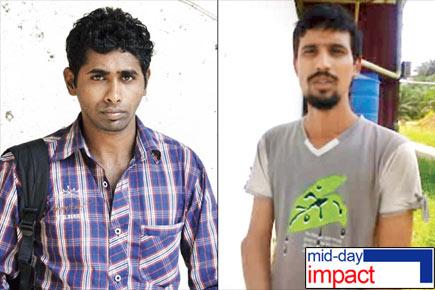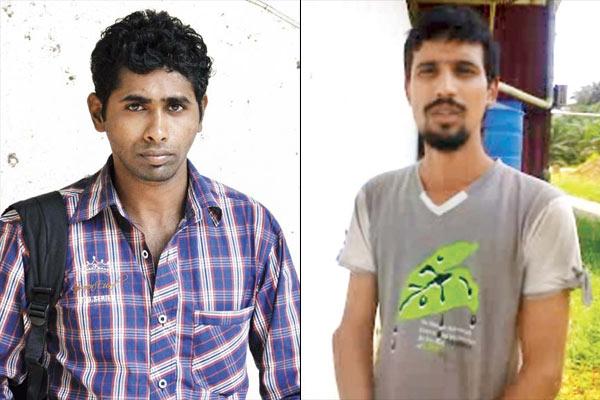After international pressure built on Malaysian government following mid-day's coverage of the horrifying plight of human slaves, a team of cops, immigration officers swooped in on factory and rescued them

Malaysian human slave mafia, Malaysia, 24 Indians rescued, mid-day impact, Mumbai news, human trafficking, Indian sailors rescued, Lokesh Sapaliga, Narender Singh, Prabhat
After this paper’s exposé of the Malaysian human trafficking mafia that had forced Indian workers to slave in a fibre-processing factory, government authorities were forced to intervene and rescue the trapped workers from the factory. The action was taken after local activists and lawmakers took up the cudgels against the exploitation.
ADVERTISEMENT
Also read: Mumbai man's daring escape from human slavery mafia in Malaysia
On November 7 and November 10, mid-day had published front-page accounts of 27-year-old Lokesh Sapaliga from Andheri and 22-year-old Narender Singh from Punjab. Both had narrated the horror they had encountered at the factory of CM Fibre Processing SDN BHD in Sibu, Sarawak, where they had to toil for 18 hours a day, and were paid a pittance in return. They had told this reporter how they were fed rotten food and were beaten up by the guards regularly. Both had been conned into taking the job on the pretext of working on a ship.

Prabhat, the Indian-origin agent in Malaysia who has disappeared with Narender Singh’s passport due to which Singh is stuck there
While Sapaliga made a daring escape in the middle of the night and returned home to India, Singh could only go as far as his friend’s place in Malaysia, since his passport and documents were with the placement agent, Prabhat, who brought him there. Singh, in fact, is still living with a fractured hand – he broke his hand after a fall from the furnace.
Outrage
The heartrending stories caught the attention of the media across Indian territories, and following mounting pressure, the Malaysian government intervened in the matter. On Tuesday afternoon, the local police and a team of reporters barged into the factory and rescued 24 Indians and some Nepalis. With the police action, CM Fibre has deactivated their websites and deleted all numbers of company officials from the websites.

Lokesh Sapaliga and Narender Singh
According to the labourers working in the factory, a team of policemen, accompanied by immigration officials and reporters, reached the factory around 3.30 pm local time, and took one Nepali and two Indians with them. Post- interrogations of the trio, another team arrived in a couple of hours and took away another lot of 25 Indians.
Surjit Thapa, a Kolkata resident who was in the first lot, said, “The team arrived at the factory in the afternoon and asked for all the workers who wanted to go back to their country. We stepped forward, following which they brought us to this government office and detained us. They are now checking our details.”

mid-day's front page reports on November 7 and November 10, in which two men, who managed to escape the factory, spoke out on the inhuman conditions there
Like Sapaliga and Singh, Thapa was also promised job on the ship and was eventually forced to work in the factory. “It was torturous. We worked day and night, but were starved. Thankfully, someone has come to our rescue. I hope we reach our country soon,” he said.
Another Nepali worker, who had paid Rs 1.5 lakh, added, “I hope they take action against the company that has kept us under house arrest. They should be taken to task.”
Unfortunately, some Nepali workers were unaware of the pressure on the government to release them, and they disappeared when the rescue team arrived. “If they take us from here, we will be sent to police lock-up for the lack of a passport and relevant documents. There will be no hope of recovering the money we paid to the agent. Who will bear our legal expenses?” said Dilip Khatri, a Nepali national who preferred to stay back. When mid-day tried explaining that the team was there to help him, he disconnected the phone abruptly.
Watch video: 24 Indian sailors trapped as slaves in Malaysia factory
A report published in Malaysia’s local news outlet malaymailonline stated: “The government do not pay heed to cases of employers switching the employment contracts of migrant workers upon arrival, with an estimated 90 per cent of local employers retaining the passports of the workers. Between 2012 and August 2013, there were a total of 120 cases brought under the Anti-Trafficking in Persons Act, but resulted only in 23 convictions. After years of warnings, the United States (US) recently downgraded Malaysia to Tier 3 in its annual Trafficking in Persons (TIP) report, after the country ignored warnings to draw up a plan to comply with “the minimum standards for the elimination of trafficking.””
 Subscribe today by clicking the link and stay updated with the latest news!" Click here!
Subscribe today by clicking the link and stay updated with the latest news!" Click here!






